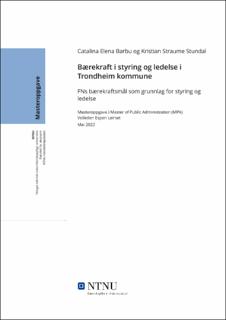| dc.contributor.advisor | Leirset, Espen | |
| dc.contributor.author | Barbu, Catalina Elena | |
| dc.contributor.author | Stundal, Kristian Straume | |
| dc.date.accessioned | 2022-09-10T17:20:28Z | |
| dc.date.available | 2022-09-10T17:20:28Z | |
| dc.date.issued | 2022 | |
| dc.identifier | no.ntnu:inspera:112629013:113204457 | |
| dc.identifier.uri | https://hdl.handle.net/11250/3017048 | |
| dc.description.abstract | Bakgrunn og hensikt: Formålet med masterprosjektet har vært å studere hvordan Trondheim kommune arbeider for en mer bærekraftig utvikling i organisasjonen. Hvordan kan kommunen praktisere styring og ledelse på en måte som tilrettelegger for oppnåelse av FNs bærekraftsmål?
Problemformulering: Hvordan bruker Trondheim kommune bærekraft i styring og ledelse?
Vi har formulert følgende forskningsspørsmål:
a) Hvordan translateres bærekraft av sentrale personer i virksomhetene vi studerer?
b) Hvor i organisasjonen og når ble bærekraft tatt inn?
c) I hvilken grad oppfatter de ulike virksomhetene og tjenesteområdene at de må arbeide på nye måter for å nå FNs bærekraftsmål?
Teoretisk forankring: Oppgaven tar utgangspunkt i et translasjonsteoretisk perspektiv der bærekraftsmålene representerer en organisasjonsidé eller organisasjonsoppskrift som skal oversettes fra de globale verdensmålene vedtatt av FN, til lokale forhold i Trondheim kommune. FNs bærekraftsmål nummer 17 «samarbeid for å nå målene» er et metodemål som legger premisser for hvordan man skal nå de øvrige målene. Vi tar utgangspunkt i nettverksledelse og verdibasert ledelse, når det kommer til hvordan bærekraftsmål nummer 17 skal forstås og oppnås.
Metode: Data innhentet fra ti dybdeintervju med ti ulike informanter fra Trondheim kommune. Disse representerer tre nivå i Trondheim kommune: politisk nivå, administrativ toppledelse og rådgivernivå.
Resultater: Følgende representerer de viktigste funnene. 1) Kommunen har ikke kommet så langt i arbeidet med kontekstualisering og lokal tilpasning av bærekraftsmålene, og det gjenstår en del arbeid knyttet til tydelig definering. 2) Kommunen synes å ha for lite samarbeid på tvers av tjenesteområdene, som samsvarer lite med bærekraftsmål nummer 17.
Konklusjon: Det er behov for å tydeligere definere hva bærekraft skal være lokalt i Trondheim kommune, og sikre en felles forståelse innen de ulike tjenesteområdene. Bærekraftsmålene kan representere et felles språk som vil kunne tjene som et godt grunnlag for samarbeid mellom tjenesteområdene, dersom kommunen lykkes med en god tverrsektoriell ledelse. | |
| dc.description.abstract | Background and aims: The purpose of this thesis dissertation has been to study how the municipality of Trondheim works towards a more sustainable development in the organization. How can the municipality apply management and leadership to enable the reaching of the United Nations’ sustainable development goals?
Central question: How does Trondheim municipality apply sustainable development in management and leadership?
We have formulated the following research questions:
a) How do key people in the different sectors we study, interpret, and apply the aims of sustainable development?
b) Where and when has sustainable development been taken into account in the municipality?
c) To which degree do the different sectors and service providers of the organization perceive the requirement to work in new ways for achieving the UN’s sustainable development aims?
Theoretical basis: At the outset, this work was set in a translational theoretical perspective where global development goals represent an organizational idea or recipe which is translated from the global aims of the UN to the local settings in Trondheim municipality. The UN’s sustainable development goal number 17 «Strengthen the means of implementation and revitalize the global partnership for sustainable development» is a methodological goal which lays the premises for how the other goals should be reached. In the analysis, our work is based on network management and value-based management as to how development goal number 17 shall be interpreted and reached.
Method: Data collected from ten in-depth interviews with different actors in Trondheim Municipality. These represent three levels in the municipality: the political level, the administrative top leadership, and the advisor level.
Results: The most important findings are: 1) The municipality has not made much progress in terms of contextualizing and local adaptations of the sustainable development goals, and much work related to defining the goals remains to be done, and 2) the municipality appears to have little partnership across services, thus only poorly responding to sustainable development goal number 17.
Conclusion: A clearer definition of sustainable development must be made for Trondheim municipality in the local context, and the different sectors in the municipality must have a common appreciation of the goals. The sustainable development goals can represent a common understanding which would serve as a good foundation for partnership across the services, provided that the municipality achieves a good cross-sector management. | |
| dc.language | nob | |
| dc.publisher | NTNU | |
| dc.title | Bærekraft i styring og ledelse i Trondheim kommune | |
| dc.type | Master thesis | |
